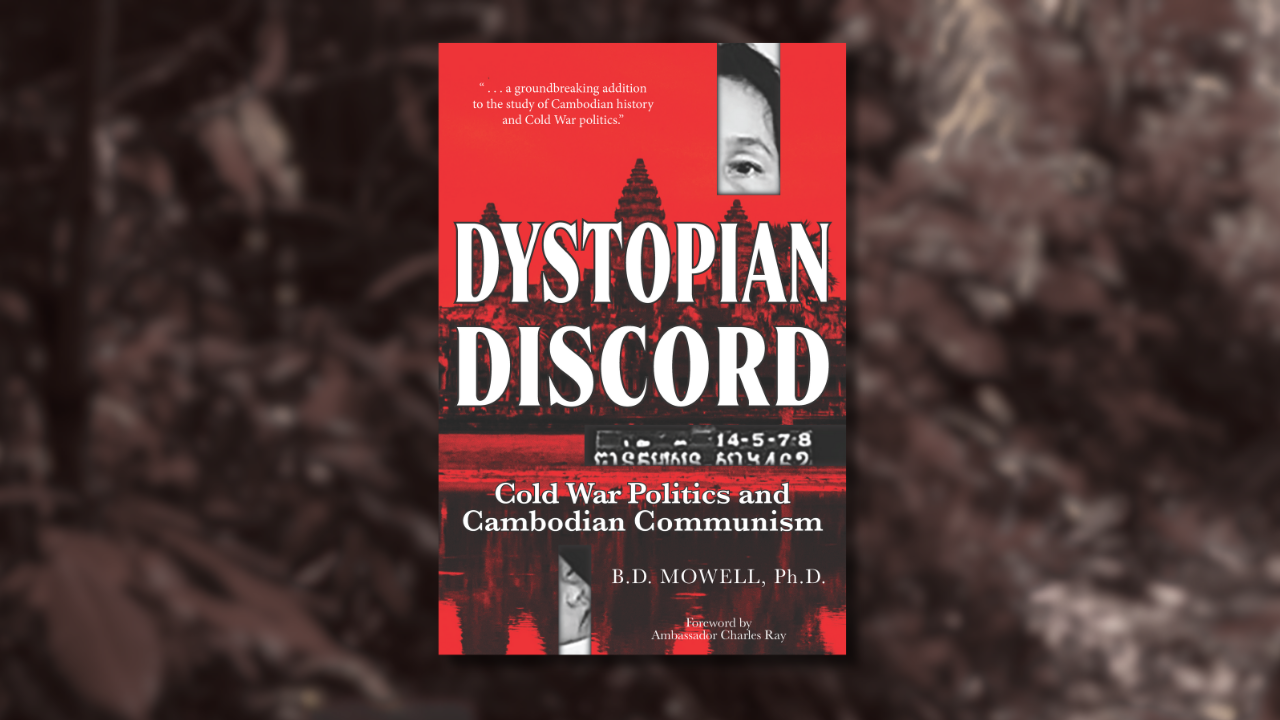With its September 23 release fast approaching, Dr. B.D. Mowell’s Dystopian Discord: Cold War Politics and Cambodian Communism is already drawing acclaim from scholars and diplomats. A groundbreaking new study, Dystopian Discord examines the Khmer Rouge within the broader context of Cold War politics, revealing how ethnic nationalism, xenophobia, and ideological extremism fueled on of the most catastrophic regimes in modern history. Drawing from newly declassified sources, this book challenges the oversimplified idea of a united communist bloc, instead exposing the fractures that led to conflict among communist states in Southeast Asia. Early praise highlights this work’s scholarly and practical value.
Scholarly Perspective: Dr. Sophal Ear
Dr. Sophal Ear, an Associate Professor at Arizona State University, underscores the book’s academic rigor while highlighting its accessibility for students and researchers. With a Ph.D. in Political Science from the University of California, Berkeley, and a career devoted to the study of governance and international relations, Dr. Ear’s endorsement reflects both scholarly authority and disciplinary depth:
B.D. Mowell’s Dystopian Discord: Cold War Politics and Cambodian Communism provides a compelling and meticulously researched narrative that illuminates the intricate tapestry of geopolitical strife and internal discord that characterized the Khmer Rouge era. This book masterfully situates the Khmer Rouge within the broader context of Cold War politics, revealing how ideological extremism and ethnic nationalism fueled one of history’s most tragic revolutions.
Mowell’s analysis is both profound and accessible, making it an essential read for scholars and students of international relations and political science alike. His exploration of the catastrophic impact of xenophobia and nationalism under the Khmer Rouge regime offers crucial insights into the dangers of extremist ideologies in any society.
Dystopian Discord is a groundbreaking addition to the study of Cambodian history and Cold War politics. It challenges oversimplified narratives of communist unity and ideological conformity, presenting instead a nuanced view of the internal and external conflicts that led to one of the most dark periods in modern history.
This book is not only a scholarly achievement but also a resonant warning about the power of ideology to shape global conflicts. It is a vital resource for anyone seeking to understand the complexities of Southeast Asian politics and the enduring impact of the Cold War’s ideological battles.
Diplomatic Perspective: Ambassador Charles Ray
Ambassador Charles Ray, who served as U.S. Ambassador to Cambodia from 2002–2005, offers a complementary perspective:
Dystopian Discord: Cold War Politics and Cambodian Communism by B.D. Mowell is an in-depth historical perspective of the Khmer Rouge, or Cambodian Communist faction, that implemented a reign of terror in Cambodia that led to the death and displacement of millions. The author, in a highly academic and well-researched tome, examines how cultural and historical factors influenced the direction and tenor of Cambodia’s communist movement, thereby highlighting the limitations of the belief in a global communist movement that motivated Western actions during the Cold War period.
As someone who, early in my military career in the 1960s, has been indoctrinated by the “domino theory,” which posited the necessity of U.S. involvement in Vietnam to forestall the fall of the rest of S.E. Asia to the monolithic threat, only to discover that historical antipathies among the various countries of the region meant that a monolithic Communist movement was all but impossible, I can relate to Mowell’s account of how the uniqueness of Khmer culture and history led to conflict between Cambodia and Vietnam despite both being communist.
While this work, due to its academic nature, may be difficult for the lay reader to follow, it is well worth the effort for the understanding it conveys of the role that culture and history play in shaping the nature of a governing system. It helps us to understand the tragedy that unfolded in Cambodia after the Khmer Rouge takeover in the 1970s and the subsequent turmoil that has plagued the country since.
For anyone seeking to gain a deeper understanding of the complexities of Southeast Asia, it’s well worth the effort to read this book.
Emphasizing the book’s real-world relevance, Ambassador Ray’s reflection confirms Dystopian Discord‘s practical value for diplomats, policymakers, and engaged readers who want to understand Southeast Asia beyond the headlines.
A Book Bridging Scholarship and Practice
Together, these reviews highlight Dystopian Discord‘s dual significance as a rigorous academic contribution and a practical resource for understanding contemporary geopolitics. By weaving together scholarly insight and diplomatic perspective, early readers affirm that this book is both timely and enduring in its relevance.
Mark your calendar: Dystopian Discord releases September 23, 2025. Be the first to explore this groundbreaking contribution to Cold War and Southeast Asian studies.


Leave a Reply